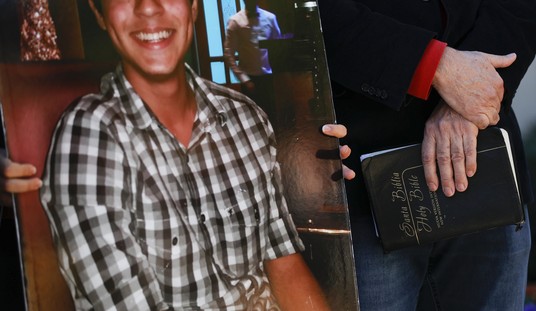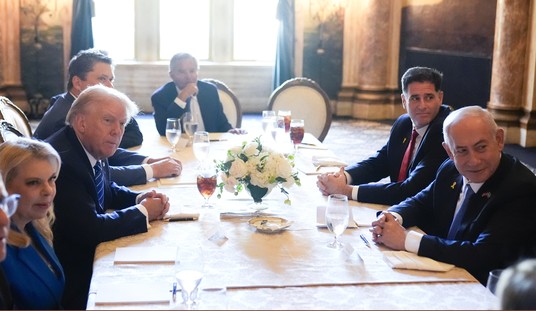“Tuesday seems to be the first time we can do it,” Donald Trump explained as he announced a decision to visit Puerto Rico next week after the massive damage done by Hurricane Maria. “I may also stop at the Virgin Islands,” Trump added, noting the impact of Maria on those US territories. During the announcement, Trump continually praised the efforts of FEMA, reminding the press that his administration may not be talking on Puerto Rico as much as they are acting in response to the natural disaster:
Moments ago, @POTUS announced he will travel to Puerto Rico on Tuesday to see damage. pic.twitter.com/Ed2CzxEIkh
— Fox News (@FoxNews) September 26, 2017
NBC notes that Trump emphasized the difficulties involved as well as their priority in getting assistance to the island:
"I think we're really getting really good marks for the work we're doing," Trump says of the response in Puerto Rico https://t.co/jLFOklxWzG
— NBC News (@NBCNews) September 26, 2017
Has the administration gotten high marks? Not exactly, but that has little to do with performance, and more to do with Trump’s Twitter habits. As one example, the Washington Post’s Philip Bump analyzed Trump’s social-media output to declare that the president “is more interested in NFL protests” than victims in Puerto Rico:
Since last Friday, he’s tweeted about anti-police violence protests at NFL games some two dozen times — far more than he’s tweeted about North Korea or about health-care revision or about the special election in Alabama. It has consumed him. Four tweets on Saturday. Seven on Sunday. Eight on Monday. Four before 9 a.m. on Tuesday.
The pattern of Trump’s tweeting is clear: He latches on to a subject and then floods the zone (to use an apt analogy) for a few days. Now it’s the NFL protests. Before that, international relations (through the lens of the U.N. General Assembly’s week of meetings). Before that, the aftermath of Hurricane Harvey in Texas and Irma in Florida. …
After the contrast between his eager tweets about the NFL and apathy about Puerto Rico was raised by journalists on Monday, Trump tweeted several times about the island.
Bump usually does good work, but this is exceedingly facile and silly. Which matters more — the amount of effort going into Trump’s tweets, or the amount of effort going into relief for Puerto Rico? Yes, optics matter in politics, but this puts the priority on optics and on social media. We’re back to using hashtags as replacements for actual hard work. How much success did #SaveOurGirls have on Boko Haram? Shouldn’t the national media be more focused on efforts than talk?
What has the administration actually accomplished on relief for Puerto Rico? Teri Christoph dug into the story at RedState, and found out that the White House has provided a strong effort:
As it turns out, the U.S. is doing a quite a lot to help Puerto Rico and the USVI in their rescue, recovery, and rebuilding efforts. A spokeswoman for FEMA told RedState that they are working closely with other federal agencies to coordinate the response with Governor Mapp of the USVI and Governor Rossello of Puerto Rico. “Hurricane Maria had devastating effects on the islands, seriously impacting communications, power and logistical access. While significant progress is being made, there is still a long way to go. As access to ports, airfields, and roads continues to become available, additional resources will continue to flow into hard hit areas.”
Doug Domenech, newly confirmed Assistant United States Secretary of the Interior for Insular Affairs, communicates regularly with the governors of both territories. Interior has many employees living on the islands, they oversee national parks there, plus they are the primary interface between the Federal government and the territories. While the department does not provide emergency services, Domenech told RedState that he has been involved in the government’s response, and that “there are tons and tons commodities that are being teed up — being sent or already have been sent.”
“The limiting factor,” said Domenech,”is the sheer logistics problem of moving lots of material anywhere. You can’t really send planes unless you know there’s fuel there to send it back.” Additionally, planes can only be flown in during the day because control towers don’t have power. And when relief planes get there, there isn’t anyone to help unload the supplies. …
A FEMA report from this morning notes: “A total of 346,000 meals were scheduled to arrive in Puerto Rico yesterday, and 168,000 meals and 100,000 liters of water arrived in St. Croix. The SS Wright has docked in St. Thomas with 1,100,000 meals, 27 General Services Administration (GSA) vehicles, and 9,496 hygiene kits.”
The issue here isn’t so much the executive branch as it is Congress. A relief bill is moving on Capitol Hill, but not quickly enough for Governor Ricardo Rosselló:
Gov. Ricardo A. Rosselló of Puerto Rico said on Monday that the island was on the brink of a “humanitarian crisis” nearly a week after Hurricane Maria knocked out its power and most of its water, and left residents waiting in excruciating lines for fuel. He called on Congress to prevent a deepening disaster.
Stressing that Puerto Rico, a United States territory, deserved the same treatment as hurricane-ravaged states, the governor urged Republican leaders and the federal government to move swiftly to send more money, supplies and relief workers. It was a plea echoed by Puerto Rico’s allies in Congress, who are pushing for quick movement on a new relief bill and a loosening of financial debt obligations for the island, which is still reeling from a corrosive economic crisis. …
And Mr. Rosselló did not mince words about the potential impact on the mainland, where Puerto Ricans are expected to arrive in droves to escape the post-Maria hardships they will face on the island, including a shortage of already hard-to-find jobs.
“If we want to prevent, for example, a mass exodus, we have to take action. Congress, take note: Take action, permit Puerto Rico to have the necessary resources,” Mr. Rosselló said.
The White House appears to be taking the relief effort seriously. Perhaps Congress and the media can start doing the same. The catastrophe in Puerto Rico and the distress of our fellow Americans there goes beyond partisan politics, so let’s not try to stuff it into that paradigm.
Update: Some critics want Trump to waive the Jones Act, which requires all goods moved between two US ports to be US-flagged and majority-owned by US interests. Because of the near-simultaneous pressures of Hurricanes Harvey and Irma, the administration offered brief waivers to that requirement, but now claims that there is sufficient capacity for Puerto Rico relief:
In its statement, DHS said that the waiver request for Puerto Rico was different, since any supply issue there would not be caused by lack of available US-flagged vessels.
“After Hurricanes Harvey and Irma, the rationale for a Jones Act waiver was to facilitate movement of petroleum to numerous places along the east coast, and making up for the loss of very high capacity pipelines,” DHS said. “The situation in Puerto Rico is much different.”
Once again, this may be more Congress’ call than Trump’s, as Reason’s Scott Shackford writes. Don’t expect Trump to get behind that effort, though, as it was designed as a protectionist law.
The Jones Act exists to boost the American shipping industry. It has long contributed to the dramatic costs of shipping to Puerto Rico. A New York Fed report from 2012 shows that it costs twice as much to ship something from a port in the U.S. mainland to Puerto Rico as it does to ship to Jamaica and the Dominican Republic nearby. There are only a handful of Jones Act–compliant options, and that lack of competition allows U.S. shippers to charge much higher prices.
People who think the government should intervene to stop price-gouging during a disaster should know the Jones Act practically facilitates it and makes recovery all the more expensive. …
In response to Puerto Rico’s current crisis, Lincicome tells Reason if a complete repeal is not in the works, then at the very least its rules should be waived for all shipping to Puerto Rico for the foreseeable future, not just for shipping fuel. “You’re looking at a clear and avoidable economic burden being placed on the people of Puerto Rico,” he says.
If Congress feels enough pressure in this case, they can either repeal the law, or amend it to have an automatic waiver period when the executive declares a state of emergency for a region. That will alleviate the political pressure to revisit the issue each time.







Join the conversation as a VIP Member